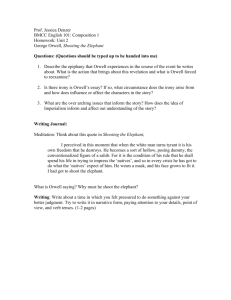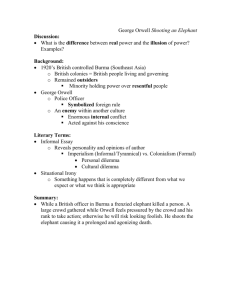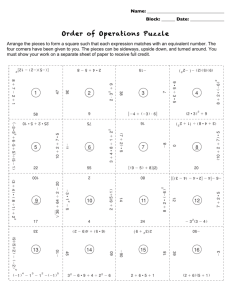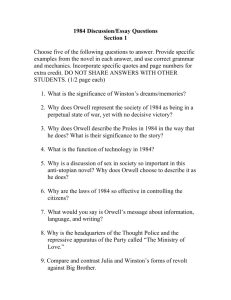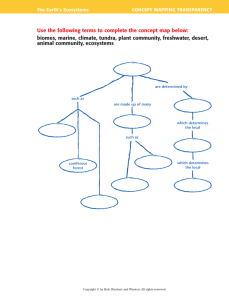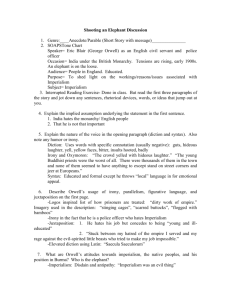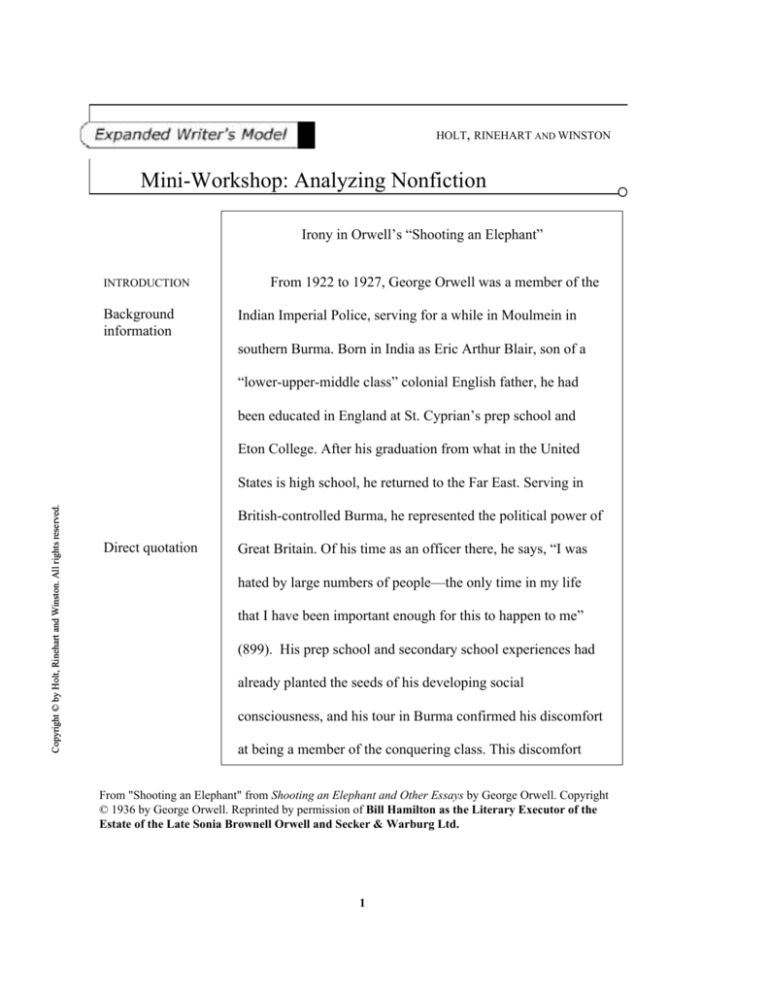
HOLT, RINEHART AND WINSTON
Mini-Workshop: Analyzing Nonfiction
Irony in Orwell’s “Shooting an Elephant”
INTRODUCTION
Background
information
From 1922 to 1927, George Orwell was a member of the
Indian Imperial Police, serving for a while in Moulmein in
southern Burma. Born in India as Eric Arthur Blair, son of a
“lower-upper-middle class” colonial English father, he had
been educated in England at St. Cyprian’s prep school and
Eton College. After his graduation from what in the United
Copyright © by Holt, Rinehart and Winston. All rights reserved.
States is high school, he returned to the Far East. Serving in
British-controlled Burma, he represented the political power of
Direct quotation
Great Britain. Of his time as an officer there, he says, “I was
hated by large numbers of people—the only time in my life
that I have been important enough for this to happen to me”
(899). His prep school and secondary school experiences had
already planted the seeds of his developing social
consciousness, and his tour in Burma confirmed his discomfort
at being a member of the conquering class. This discomfort
From "Shooting an Elephant" from Shooting an Elephant and Other Essays by George Orwell. Copyright
© 1936 by George Orwell. Reprinted by permission of Bill Hamilton as the Literary Executor of the
Estate of the Late Sonia Brownell Orwell and Secker & Warburg Ltd.
1
HOLT, RINEHART AND WINSTON
Mini-Workshop: Analyzing Nonfiction
provides the backdrop for his first published essay, “A
Hanging” (1931), and for his first novel Burmese Days, (1934).
Title of essay
Author
In his much-anthologized essay “Shooting an Elephant,”
George Orwell graphically describes an incident that he
experienced as a young police officer in colonial Burma.
Called to handle an elephant in “must” that is on the rampage
and has killed a native, Orwell realizes too late that he will
Copyright © by Holt, Rinehart and Winston. All rights reserved.
have to shoot the elephant, a valuable piece of property
belonging to its absent Burmese mahout (elephant keeper), not
because of the danger that the elephant poses to the natives, but
to save face, especially because he represents British colonial
power. Orwell’s description of the unfortunate incident reveals
his attitudes toward both himself as a colonial officer and the
Thesis statement
natives he policed. To communicate his theme that tyranny
debases the oppressors as much as the oppressed, Orwell
ironically describes this incident he experienced as a young
police officer in colonial Burma.
Key point 1:
Situational irony
As a subdivisional police officer in Moulmein, Orwell
2
HOLT, RINEHART AND WINSTON
Mini-Workshop: Analyzing Nonfiction
finds himself in several ironic situations. First, he is required to
carry out publicly policy he does not believe in privately. As
Evidence: direct
quotations
representative of the imperialist government, his job allows
him to see “the dirty work of Empire at close quarters” (899).
Much of the work he does fills him with guilt because of the
conditions he must enforce. He finds the scenes of “the
wretched prisoners huddling in the stinking cages of the
lockups, the gray, cowed faces of the long-term convicts” (899)
Copyright © by Holt, Rinehart and Winston. All rights reserved.
to be oppressive. However, privately, he despises the people
who taunt him in public; the natives infuriate him with their
insults and jeers. He is the object of ridicule in public, and he
confesses that he would like nothing better than to “drive a
bayonet” into his taunters (900). He finds himself “stuck
between [his] hatred of the empire [he] serve[s] and [his] rage
against the evil-spirited little beasts who tried to make [his] job
Elaboration
impossible” (900). Orwell finds his situation intolerable but
impossible to escape. He also finds it impossible to escape the
consequences of such a situation.
Key point 2:
Situational irony
His account of his killing an elephant dramatizes one of
3
HOLT, RINEHART AND WINSTON
Mini-Workshop: Analyzing Nonfiction
those consequences of his ironic situation—a second example
Evidence:
Summary
of situational irony. Alerted to the dangers of the elephant,
which has killed a coolie (unskilled worker) in its rampage,
Orwell borrows an elephant gun. Only when the natives think
that he is going to shoot an elephant do they become interested
Elaboration
enough to follow him. Ironically, the natives are not interested
in the elephant as long as it is raging. They become interested
only when they see Orwell’s gun and realize they might
Copyright © by Holt, Rinehart and Winston. All rights reserved.
capitalize on a source of free meat.
Evidence:
Summary
When Orwell sees the elephant, now standing passively
and eating, he realizes that the elephant’s “must” has passed.
Yet because the crowd, swelling to some two thousand people
behind him, expect him to kill the elephant, Orwell feels he
must bend to their will. Because he fears the crowd’s laughter
at his failure to act more than he fears the elephant owner’s
Evidence: Direct
quotation
anger, he proceeds with his task. This situation of doing
something because the crowd of natives wants him to and
expects him to dramatizes “the real nature of imperialism—the
Elaboration
real motives for which despotic governments act” (900). He
4
HOLT, RINEHART AND WINSTON
Mini-Workshop: Analyzing Nonfiction
has acted not out of necessity, not even for a moral reason, but
because his failure to act might make him look foolish in the
Evidence: Direct
quotation
eyes of the natives. After all, “a sahib has got to act like a
sahib; he has got to appear resolute, to know his own mind and
Elaboration
do definite things” (902). The irony is that Orwell is not sure of
his own mind and he does a “definite thing” (killing an
elephant) so poorly that its value was debated afterward.
Key point 3:
Situational irony
A third example of situational irony is the actual
Copyright © by Holt, Rinehart and Winston. All rights reserved.
elephant kill. Orwell finds himself in the ironic position of
being called on to perform a task for which he is ill-suited.
Evidence:
Paraphrase
Orwell admits to the reader that he was not an experienced
marksman, nor did he know then exactly where he should aim
to make the most efficient rifle shot. Moreover, the ground is
soft mud, and he must lie down “on the road to get a better
Elaboration
aim” (903). His lack of preparation for the task he is called on
to perform is thematic in his essay. At that point in its history,
the British Empire, Orwell indicates, was ill-prepared to rule
from halfway around the world a people so different and
resentful of its presence.
5
HOLT, RINEHART AND WINSTON
Mini-Workshop: Analyzing Nonfiction
Key point 4:
Verbal irony
Throughout his essay, Orwell’s tone is straightforward
and unemotional as he reports the details of the incident. The
objectivity of his reporting style sets up his use of verbal irony.
Sometimes the result of his irony is humorous. For example,
when he describes the natives’ glee at seeing him march toward
the paddy fields a few hundred yards away, he comments,
Evidence: Direct
quotation
“They had not shown much interest in the elephant when he
was merely ravaging their homes, but it was different now that
Copyright © by Holt, Rinehart and Winston. All rights reserved.
Elaboration
he was going to be shot” (901). The impact of the sentence’s
verbal irony turns on the word merely. Orwell indicates the
natives are thrill seekers, not caring as much for their own
welfare when it is threatened by the elephant as they do for the
excitement and entertainment of watching a dangerous
confrontation between man and elephant. His use of verbal
irony indicates his contempt for the foolishness of the natives
that value sport over their own safety.
Key point 5:
Verbal irony
Orwell uses verbal irony for serious purposes also. For
example, another effect of his unemotional tone is that it
conveys and intensifies the horror of the elephant-killing
6
HOLT, RINEHART AND WINSTON
Mini-Workshop: Analyzing Nonfiction
Evidence:
Summary
incident. He cites in great detail the various steps he took to
accomplish his task. Misaligning his first rifle shot, he shoots
again and again. When the elephant still continues to breathe,
Orwell fires his final two rifle shots into the animal’s heart.
The elephant continues its tortured breathing, “powerless to
move and yet powerless to die” (904). Retrieving a smaller
rifle, Orwell empties it into the beast’s heart and throat, trying
to stop the unnerving sound of the animal’s dying breaths, but
Copyright © by Holt, Rinehart and Winston. All rights reserved.
to no avail. Walking away in disgust at his own inefficiency,
Orwell learns later that the animal took at least thirty more
minutes to die before its flesh was stripped to the bones by the
Elaboration
knife-wielding crowd of natives. By describing his role in the
death of the elephant in such detail and with such an
unemotional tone, Orwell underscores his use of verbal irony,
since the number of explicit details obviously plays upon the
readers’ feelings.
Key point 6: Final
irony
A final dimension of Orwell’s irony is related to his use
of the details as symbols. Orwell’s perspective—an older man
narrating events of his young adulthood—invites the reader to
7
HOLT, RINEHART AND WINSTON
Mini-Workshop: Analyzing Nonfiction
consider his expanded description of the death of the elephant
as symbolic, especially because of historical changes and
events between the time that Orwell was a youth and an adult.
As Orwell documents the changes in the elephant from living
animal to carcass, he describes the scene so that it almost
seems to happen in slow motion. The animal is stunned, then
Evidence: Direct
quotation
slowly falls to its knees, rises, then falls again after Orwell
shoots for the third time. “But in falling he seemed for a
Copyright © by Holt, Rinehart and Winston. All rights reserved.
moment to rise, for as his hind legs collapsed beneath him he
seemed to tower upward like a huge rock toppling, his trunk
reaching skyward like a tree. He trumpeted, for the first and
only time. And then down he came . . . with a crash that
seemed to shake the ground. . . .” (904). The overall image is of
a huge animal struggling mightily with what has happened to it.
In addition to the slow motion of the description, Orwell
also emphasizes the elephant’s apparent age. In the aftermath
Evidence: Direct
quotation
of his first shot, “a mysterious, terrible change had come over
the elephant. . . . He looked suddenly stricken, shrunken,
immensely old. . . . An enormous senility seemed to have
8
HOLT, RINEHART AND WINSTON
Mini-Workshop: Analyzing Nonfiction
settled upon him. One could have imagined him thousands of
Elaboration
years old” (903–904). Both the slow death and the age of the
elephant suggest a parallel to the slow decline of the British
Empire. Orwell suggests that, like the elephant, the British
Empire was dying a long, slow, messy death. Orwell invites
Evidence: Direct
quotation
that comparison when earlier in his essay he observes, “I did
not even know that the British Empire [was] dying, still less
did I know that it [was] a great deal better than the younger
Copyright © by Holt, Rinehart and Winston. All rights reserved.
Elaboration
empires that [were] going to supplant it” (900). Of course, the
irony underlying his comment is that Orwell uses himself to
represent the agent of death to the British Raj—a young,
inexperienced officer, swayed by the unarmed will of a people,
who abandons the results of his efforts to the natives and their
dahs (sharp, heavy knives).
CONCLUSION
In “Shooting an Elephant,” Orwell crystallizes his
ambivalent feelings about being an officer in Burma. As an
agent of the empire, he was required to enforce a system whose
aims and methods he rejected. He understood and sympathized
with the Burmese people’s anti-European attitude, yet their
9
HOLT, RINEHART AND WINSTON
Mini-Workshop: Analyzing Nonfiction
behavior infuriated him. He reveals himself to the reader as
foolish and inept—characteristics he could not admit to the
thousands of natives who watched him shoot an elephant.
Restatement of
thesis
Orwell’s use of irony in describing the natives’ behavior before
and after the incident, as well as his own, establishes the
Final thought
incident as symbolic. Orwell’s essay indicates that the British
Copyright © by Holt, Rinehart and Winston. All rights reserved
Raj was doomed, but that the countries it left behind perhaps
would fall victim to the practices of scavengers.
10

